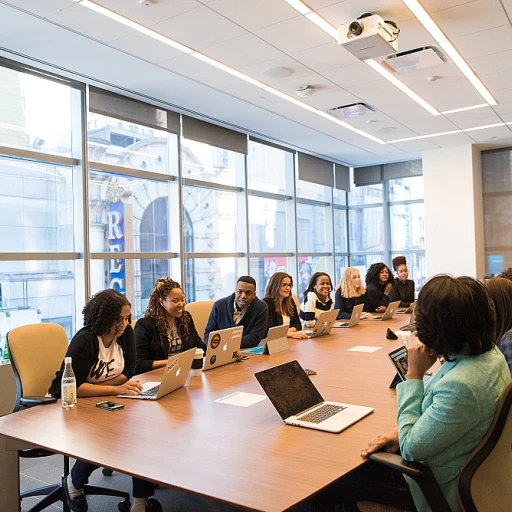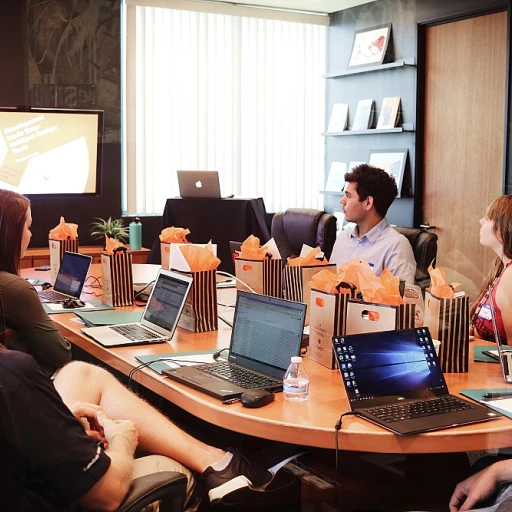
Understanding the impact of employee appreciation themes
Why Employee Appreciation Matters in Today’s Workplace
Employee appreciation is more than just a nice gesture—it’s a strategic element that shapes company culture and drives employee engagement. When employees feel valued for their hard work, they are more likely to stay motivated, contribute innovative ideas, and build stronger team connections. Recognition programs and appreciation days, such as a dedicated Friday in March or a staff appreciation day, can help reinforce a sense of belonging and boost morale across teams.The Ripple Effect of Recognition on Teams and Organizations
Appreciation has a direct impact on both individual employees and the broader organization. When team members are recognized for their contributions, it can:- Increase employee engagement and satisfaction
- Strengthen team building and collaboration
- Enhance workplace culture and loyalty
- Reduce turnover and absenteeism
Creative Approaches to Recognizing Employees
Traditional rewards recognition programs are evolving. Organizations are now exploring creative ways to celebrate employee contributions, from themed appreciation days to personalized gifts and team-building activities. The goal is to make every employee feel recognized in a way that resonates with them, fostering a positive and inclusive company culture. For those seeking inspiration, exploring incentive program ideas for boosting motivation can offer practical examples of how appreciation can be woven into daily work life. As we move forward, leveraging HR analytics will play a crucial role in identifying which appreciation strategies are most effective for different teams and individuals. This data-driven approach ensures that recognition efforts are not only meaningful but also aligned with organizational goals.Leveraging HR analytics to identify effective appreciation strategies
How Data Guides Employee Appreciation Efforts
Organizations are increasingly turning to HR analytics to refine how they recognize and celebrate employee contributions. By analyzing data from employee engagement surveys, recognition program participation, and performance metrics, HR teams can uncover what truly resonates with their staff. This approach helps companies move beyond generic appreciation day ideas and create more meaningful, impactful experiences that make employees feel valued.
- Identifying what works: HR analytics can reveal which appreciation ideas—such as team building activities, fun rewards, or staff appreciation events—are most effective at boosting morale and engagement.
- Spotting trends: By tracking participation rates and feedback, organizations can see if certain rewards, like a gift card or extra time off, are more popular among specific teams or departments.
- Measuring impact: Data-driven insights allow companies to see how recognition programs influence employee engagement and company culture over time.
For example, reviewing analytics from previous appreciation days or recognition events can help HR teams understand which activities led to higher employee satisfaction and which fell flat. This evidence-based approach ensures that appreciation efforts are not just well-intentioned, but also effective in making employees feel appreciated and boosting overall workplace culture.
To see how organizations are leveraging analytics to understand employee dynamics and improve recognition strategies, you can explore this case study on employee dynamics.
Ultimately, using HR analytics to guide appreciation initiatives helps companies celebrate their teams in ways that align with their unique culture and needs, ensuring every employee feels recognized for their hard work and contributions.
Personalization of appreciation: Using data for tailored recognition
Turning Data into Meaningful Recognition
Personalization in employee appreciation is more than a trend—it's a proven way to make employees feel valued and boost morale. By using HR analytics, organizations can identify what truly resonates with their teams, ensuring that recognition efforts are not only noticed but also meaningful. When employees feel appreciated in ways that matter to them, engagement and loyalty naturally increase.
- Understanding preferences: Data from surveys, feedback tools, and recognition program participation can reveal what types of rewards or appreciation ideas employees prefer. Some may value a public shout-out during a team meeting, while others might prefer a private thank-you note or a gift card.
- Tailoring rewards: Analytics can help segment employees by department, tenure, or even work style. This allows HR teams to design appreciation day ideas that fit each group—like team building activities for collaborative teams or flexible time off for those who value work-life balance.
- Tracking impact: By monitoring participation rates and employee feedback after appreciation events, organizations can refine their recognition strategies. This ensures that every staff appreciation initiative is aligned with what employees actually enjoy and value.
For example, some companies have found that offering a choice between a fun team lunch, a personalized gift, or extra time off on a Friday in March can significantly improve employee engagement. Others use analytics to identify which teams might benefit from a new recognition program or a creative reward system.
Personalized recognition also supports a positive company culture. When employees see that their unique contributions are noticed and celebrated, it encourages a sense of belonging and motivates continued hard work. This approach not only helps recognize employees but also strengthens the overall workplace culture.
For more on how data-driven approaches can shape effective recognition and leadership, check out this article on effective ways to characterize a leader.
Measuring the success of employee appreciation initiatives
Tracking the Real Impact of Appreciation Initiatives
Measuring the success of employee appreciation efforts is essential for building a culture where employees feel valued and recognized. HR analytics plays a key role in understanding how appreciation day ideas, rewards, and recognition programs influence employee engagement and company culture. Organizations often use a mix of quantitative and qualitative data to assess the effectiveness of their appreciation strategies. Here are some practical ways to measure impact:- Employee Surveys: Regular feedback helps gauge how staff appreciation initiatives make employees feel. Questions can focus on whether team members feel appreciated, how recognition affects their motivation, and if they believe their hard work is noticed.
- Engagement Scores: Tracking employee engagement before and after implementing new appreciation ideas or rewards recognition programs can highlight positive changes in morale and teamwork.
- Retention Rates: Analyzing turnover data can reveal if recognition efforts are helping to retain top talent. A drop in turnover after launching a new recognition program is a strong indicator of success.
- Participation Metrics: Monitoring participation in staff appreciation events, team building activities, or fun appreciation day events provides insight into what resonates with employees.
- Peer Recognition: Tracking how often employees recognize each other, such as through digital platforms or informal shout-outs, can show the spread of a positive recognition culture.
Using Data to Refine Appreciation Strategies
The best organizations don’t just measure—they act on the insights. By analyzing which appreciation ideas or rewards (like a gift card or a special team lunch) have the most impact, HR teams can tailor future initiatives to boost morale and make employees feel even more appreciated. For example, if data shows that team-based rewards lead to higher engagement, the company can focus on more team building activities. It’s also important to track the timing and frequency of recognition. Recognizing employees on a regular basis, not just on Employee Appreciation Day or a Friday in March, helps maintain a consistent sense of value and motivation in the workplace.Challenges in Measurement
While measuring the impact of appreciation is crucial, it’s not always straightforward. Some outcomes, like improved company culture or a sense of belonging, are harder to quantify. Combining data-driven insights with open communication ensures that recognition programs remain meaningful and effective for all teams across the organization.Overcoming challenges in implementing appreciation themes
Common Obstacles in Employee Appreciation Programs
Even with the best intentions, organizations often encounter challenges when trying to celebrate employee contributions and foster a culture of recognition. Some of the most frequent obstacles include:- Lack of time: Busy schedules can make it difficult for managers and teams to consistently recognize employees, especially during peak work periods.
- One-size-fits-all ideas: Generic appreciation day ideas or rewards may not resonate with everyone, leading to employees feeling undervalued or overlooked.
- Limited resources: Budget constraints can restrict the range of appreciation gifts, rewards, or team building activities available to staff.
- Inconsistent recognition: When appreciation is sporadic or only given to a select few, it can negatively impact morale and employee engagement across the company.
- Difficulty measuring impact: Without clear metrics, it’s challenging to know if recognition programs are truly making employees feel appreciated or boosting workplace culture.
Strategies to Overcome Implementation Barriers
Organizations can address these challenges by integrating HR analytics and feedback mechanisms into their recognition programs. Here are some practical approaches:- Leverage data: Use employee feedback and analytics to identify which appreciation ideas and rewards have the most positive impact on different teams.
- Personalize recognition: Tailor rewards and appreciation day activities to align with individual and team preferences, making employees feel valued for their unique contributions.
- Promote inclusivity: Ensure all staff have opportunities to be recognized, regardless of their role or department, to foster a sense of belonging and boost morale.
- Set clear goals: Define what success looks like for your recognition program, whether it’s improved employee engagement, higher retention, or a stronger company culture.
- Encourage manager participation: Equip leaders with easy-to-implement appreciation ideas and recognition tools, so celebrating hard work becomes part of the daily routine, not just a special event like Friday March appreciation day.
Future trends in employee appreciation and HR analytics
Emerging Technologies Shaping Employee Appreciation
As organizations look to the future, technology continues to transform how companies recognize and celebrate employee contributions. Tools powered by artificial intelligence and machine learning are making it easier to analyze employee engagement data, identify trends in recognition, and automate personalized appreciation messages. These advancements help HR teams deliver timely and meaningful rewards that make employees feel valued and appreciated for their hard work.
Data-Driven Personalization and Real-Time Recognition
Personalization is becoming central to effective employee appreciation. By leveraging data from recognition programs, companies can tailor rewards and appreciation day ideas to individual preferences, whether it’s a gift card, team building activity, or public recognition. Real-time analytics allow managers to spot moments when staff appreciation is most needed, ensuring that recognition is both relevant and impactful. This approach not only boosts morale but also strengthens company culture by making every team member feel seen.
Integrating Appreciation into Everyday Work Culture
Future trends point toward integrating appreciation into the daily workflow rather than limiting it to annual events or special days like Employee Appreciation Day or a Friday in March. Digital platforms now enable peer-to-peer recognition, making it easy for team members to celebrate each other’s achievements instantly. These systems encourage ongoing engagement and foster a culture where employees feel consistently recognized for their contributions.
Measuring Impact and Adapting Strategies
Organizations are increasingly using HR analytics to measure the effectiveness of their appreciation initiatives. By tracking participation rates, employee feedback, and engagement scores, companies can refine their recognition strategies over time. This data-driven approach ensures that appreciation ideas remain fresh, relevant, and aligned with what employees value most, ultimately supporting retention and satisfaction across teams.
- AI-powered platforms for personalized rewards
- Real-time recognition tools for instant feedback
- Continuous measurement of employee engagement and appreciation impact
- Integration of appreciation into daily work routines
Staying ahead of these trends helps organizations create a workplace where staff appreciation is not just a one-time event but an ongoing part of the employee experience. As technology and analytics evolve, so too will the ways companies celebrate and reward their teams, ensuring employees feel appreciated every day.













